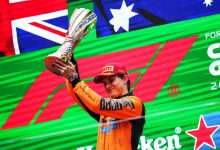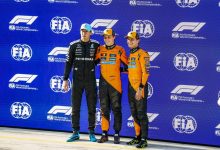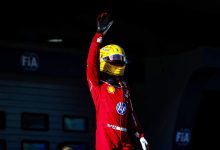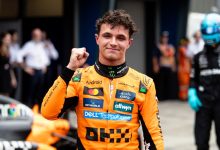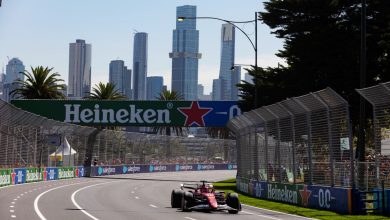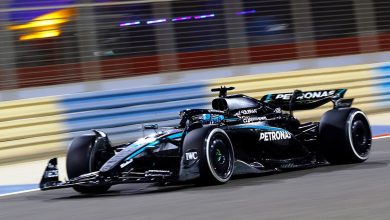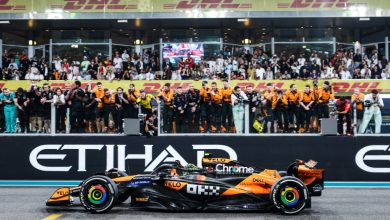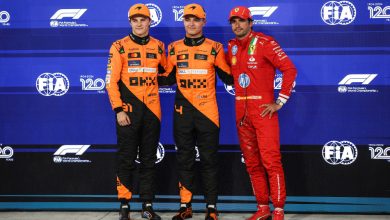It was a win on merit for McLaren, says Andrea
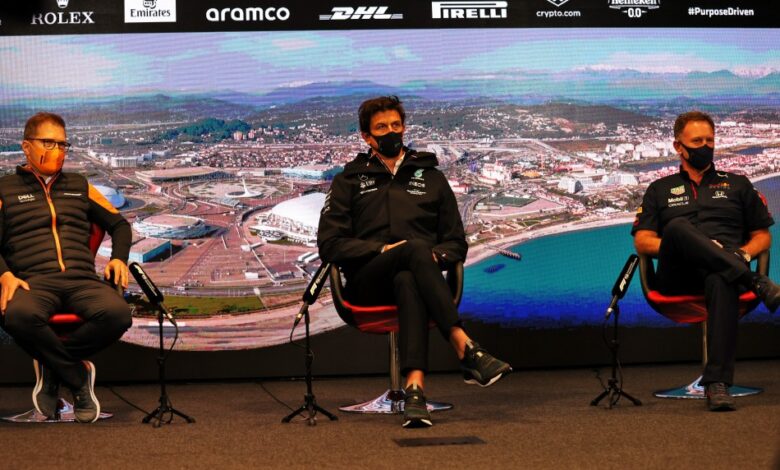
TEAM REPRESENTATIVES
PART 1: Andreas SEIDL (McLaren), Toto WOLFF (Mercedes), Christian HORNER (Red Bull Racing)
Q: Andreas, can we start with you and throw it back a couple of weeks. What a weekend for McLaren at Monza. What does that result mean for the team?
Andreas SEIDL: Well, obviously is has been a while for McLaren to have a win and a 1-2. So it was obviously a great day for all of us, for every single member of the team, also back home in the factory. In the end, simply a confirmation that we are heading in the right direction, and what was really pleasing for me to see was how we also pulled it off that weekend. It was a win on merit, on this specific track, and to have a competitive car, a reliable car, quickest lap, quickest pit stop, yeah, gives me a lot of confidence also that we have some ingredients already in place that we need on our journey back to challenging these guys next to me in some years again at each race weekend. I think that was the most important thing for me to see. Of course it was very important at the track and also back home the week after that race that we enjoyed this moment also as a team.
Q: And Andreas, what did it mean for you personally – because it’s been a while since you last won a race in Formula 1, with BMW.
AS: Well, it’s not about me, it’s about the boys and girls at McLaren. Our fans, our partners. I said before, it was just great for me to see that, as a team you’re heading in the right direction, we are making steps because that’s key and important in order to get back to the fight we want to get in, in some years again, fighting for championships as well. In order to get there, you need to make steps and obviously to pull off a win like we did this weekend at Monza is one step towards that objective or goal.
Q: And what will that victory do for Daniel Ricciardo, do you think?
AS: I think after the struggles he had in terms of adapting to our car, and having this tough first six months, it was important for him, after he came back quite strong already from Spa onwards, that it ended up in a great result as well. I think it will simply give him a lot more confidence now and a great boost in order to keep working together with the team, in order to deliver even more because I’m still convinced there’s more to come from him – but I’m very happy, obviously, with how it went with him in Monza, and I’m looking forward to have a lot more good races in the coming races and years with Daniel and Lando.
Q: You say you want a lot more good races. Has that Monza weekend changed the teams objectives for the remainder of this season?
AS: No, not at all. We have a very realistic picture of where we are at the moment. We expect a very intense battle with Ferrari for this P3 in the Constructors’ Championship up to the last race. We know we still have a lot of work to do on the team side in order to make the next steps. That’s what I admire when I look at Toto and Christian and their teams. These teams simply being able with their car, with their teams to pull it off each weekend and on each track, independent of track conditions, track characteristics, tyre selection. But, we have a clear plan in place on the team side, together with James, Piers and Andrea as well of how we want to tackle this challenge in the next years and we just need a bit more time to execute that plan.
Q: Toto, can we start please by talking about Monza as well. Having had time to reflect on what happened at that race between Lewis and Max, do you still view it as a tactical foul by Max?
Toto WOLFF: You know the point is that these two are racing for a Drivers’ Championship and you can’t expect them to have velvet gloves on. That’s why we are going to see harsh moments like this, I believe. Obviously I’m biased, and I’m looking at the whole race, how it’s panned-out. Sometimes you just need to bail out. This is what Lewis did on lap one. Could Max have done it? Probably he would have lost the position. I think it’s very difficult and dangerous, you comment with the bias that you have, obviously cheering for your driver and your team. These two know what they do, they have it under control, and I guess we had a good chance to chase the McLarens, that were there on merit – absolutely agree – and score a bit more points.
Q: You say they’ve got it under control – but do they? Do you expect them to have collisions going forward? What can we say on that?
TW: No, I think they pretty much know what they do. If both wanted to avoid collisions, we would have less collisions. If they don’t avoid collisions because they feel it’s right to not bail-out or not give room then we will have more. We are not sitting in the cars.
Q: Christian, can we bring you in on this. Do you agree with what Toto’s just said?
Christian HORNER: I agree, look they’re racers, they’re going to race and to sit here and say they’re never going to touch each other again in the next eight races, I doubt Toto has that control over Lewis and we don’t over Max. It’s down to them in their car, racing for the biggest, you know, trophy in motor racing. There are eight races to go. Obviously, we want it to be a really competitive, clean run-in to the end of the season. Inevitably when the drivers are starting next to each other so often and they’re racing at venues that are very, very tight, Max is a no-quarter kind of guy; Lewis has demonstrated that he doesn’t want to give anything either and when you get two racers of that mentality, you get incidents. Monza was unfortunate. It was a dramatic-looking accident at slow speed. It was neither driver wanting to concede and the end result was what we saw.
Q: How do they avoid contact going forward?
CH: Well, we try to make sure he’s ahead on the circuit, that’s the easiest way. The reality is that neither of them should have been near each other. Unfortunately the pit-stop that we had conceded track time for Max, and Lewis should have been well-clear and then obviously the issue at his pit stop put the two of them pretty much alongside each other. The easiest way to avoid an incident is to be far enough up the road – but I’ve got a feeling they’re going to be racing hard. It’s been so tight between the two of them, the two teams have been separated by merely a tenth on average over the season to date and I think that’s likely to continue over the last third of this championship.
Q: So what is going to be the decisive factor in this championship battle? Is it going to be car or driver?
CH: It’s going to be a combination of both, as always. So, it’s going to be the driver, it’s going to be the car, it’s going to be reliability, it’s going to be performance, it’s going to be operation, it’s going to be strategy, it’s going to be development, it’s going to be every aspect.
Q: Christian, final one from me. Lewis spoke yesterday about the pressure of fighting for the world title. How well do you think Max is dealing with that?
CH: I don’t see any change in him at all. Max is a young guy, he’s going for it, he has nothing to lose. He’s not sitting there with a bunch of World Championships defending a title, he’s the challenger and I think that’s the way he’s attacking this championship. If you see the pressure he was under with the home crowd in Zandvoort, you don’t get bigger pressure than that. I think the way he handled that in particular was truly impressive. I think that he’s just really enjoying and relishing this battle. It’s been a long, long time since we’ve been in a position like this. Of course that’s exciting for him and it’s exciting and motivating for the whole team.
Q: Toto, do you see any change in Lewis in the way he’s fighting this championship?
TW: No, they are both of them, throughout their career, have been racing at the very front of every single karting and junior series championship, and as always, there is an angle that people don’t get to see and that’s the focus, the concentration, the amount of work that he puts into the sport. He has been an instrumental part, as has Valtteri, in developing the car. They spent many days in preparation in the simulator now and no change. Actually, very upbeat, positive mood, enjoying the battle.
VIDEO CONFERENCE
Q: (Scott Mitchell – The Race) Question for Andreas please – but if Toto has anything to add, feel free – Andreas, what do you think the significance is of the team scoring its first win with Mercedes power at Monza and what does it say to the ultimate ambition of trying to become a World Championship-winning team again as an engine customer.
AS: First of all, the lap-time of a car is obviously the result of an entire package and the power unit plays an important role in that. When we made the decision that we wanted to go for the Mercedes power unit, there was a clear reason behind. We wanted to get the Championship-winning power unit at the back of our car because it simply gives us the best possible reference to know where we are as a team. I’m convinced, looking forward, that with a Mercedes power unit at the back of our car, even in this customer relationship we are having with the regulations how they are in place, also nowadays, that this is not in the way of fighting for championships again in the future. I’m just very happy, I have to say looking at these first months in this relationship, how it started. Again, I think both teams in Brixworth and in Woking have done a sensational job over the winter and the COVID restrictions as well, in order to integrate this power unit into our car. We were really ready from the first test onwards without any reliability issues, which is a great result, and I think the results we could score this year, together with the great work the team in Woking has also done on the car side, speak for themselves.
Q: (Dieter Rencken – Racing Lines) To all three, Spa saw the introduction of the FIA TD regarding pit stops and three races later we have a situation where two of you are put onto a collision course as a result of pit stops, and the third one won the race, arguably as a result of the pit stop. Any comments about the TD now in retrospect please?
CH: Well, it worked out well for Andreas! So yeah, it’s always annoying to have something change mid-season, and particularly something procedural like that. So, the TD had a direct impact on the human issue that we add in Monza, which is annoying but it’s the same for everybody, we have to learn from it, understand what went wrong, address that to try to ensure it doesn’t happen again. It was a consequence of the change that was introduced.
Toto?
TW: Yeah, it’s a procedural situation or process that, if you have done something all through these years in the same way and then in a way you need to change, that can always be a bit tricky – but it wasn’t disastrous, we have mitigation in place and that was the mitigation that helped us not to lose too much time. But it’s a new challenge
All smooth at McLaren Andreas?
AS: Well, first of all I think it’s not a secret that we had some question marks regarding the legality and safety of the pit stops of some teams in the pit lane in the last month and therefore we were welcoming this clarification from FIA before the summer break. In the end for us it didn’t mean that we had to change anything because from our point of view it was clear before how the sequence has to be like. As always, we simply focus on ourselves. We’re very happy with the progress we could make on the pit stops side, compared to previous years. At the same time, there’s still room to get better and more consistent and that’s what we are focussing on.
Q: (Jonathan McEvoy – The Daily Mail) Sir Jackie Stewart said after the race at Monza that Max is the fastest man on the grid but he has some growing up to do. Is he right on either count?
CH: Of course I always respect Sir Jackie’s opinion but I think Max has shown great maturity this year and, of course, you’re always evolving, always learning and I’m sure Sir Jackie made a few mistakes in his time. So that’s the journey of life. I think you learn from every experience and I think when you see the progression from a 17 year-old, when he came into Formula 1, to the driver he is today, it’s pretty impressive.
Q: Do you think he’s the fastest man on the grid, as Sir Jackie suggested?
CH: It’s always going to be subjective and open to debate. I’m just glad he’s driving our car.
Toto?
TW: For me also I’d like to echo what Christian said. Obviously Max isn’t driving for Mercedes so I don’t know him really well but his trajectory is impressive – not only the speed but also the way he tackles the weekends, so overall, he’s not at the end of his career, there’s more to come and part of that is the learning process.
Q: (Andrew Benson – BBC) This is for Christian, although I’d also like Toto’s comments at the end please. Christian, if we look back over the incidents between Max and Lewis over the season, whether they’ve collided with each other or not, the characteristics have been that there have been some that Lewis has backed-out of when he’s felt that Max has won the corner, and it was better to fight another day, and none that Max has backed out of. Do you think that Max needs to… have you ever discussed with Max whether he needs to sometimes think about backing out of incidents where he’s playing the percentages? And, if you haven’t, do you think you should?
CH: Of course we always review any incident and look at it very carefully, and you always think, OK, could I have done anything different, could I have done anything better? I think that Max is always very open to that. He’s extremely self-critical. You’re always learning – but he’s a hard racer, it’s part of his characteristic, it’s part of why he has the following that he does. You know that when he’s in the car, he’s going to give 110 per cent. I think that also has the impact on the driver that he’s racing, because they just know he’s going to go for it – but of course, there has to be measure, and I think at the right times he has shown that measure in different races even that we’ve seen this year. But, it’s part of the character that he is, that he’s an attacking driver. It’s part of his make-up and I don’t think that’s going to change.
TW: Yes, they also race each other very close now which wasn’t the case in the past and we are discussing these things in detail as well and I think the change of approach is that Lewis decided not to bail out anymore when he thinks that the corner is his. And now it needs two to tango, it needs two to understand each other on track when a collision can be avoided, but like Christian said, they are in the cars, we have no influence on the driving, they will know much better than we how the other one is racing yourself. It’s interesting to watch.
Q: In your opinion, how much respect does each have for the other?
TW: I think the very good ones recognise the other very good ones, and therefore from a driving standpoint, there will be a lot of respect with each-other, like with some others on track. The personalities are very different, the lives are very different – but that has no interference on the respect of the ability of the other guy in the car.
Q: (Christian Nimmervoll – Motorsport.com) Christian and Toto, you dear friend Cyril Abiteboul a couple of years ago, I remember him calling for a 16-race calendar, because his logic was when you look tired and you are tired you can’t communicate a positive message for F1 into the world, and he also said the individual price of grands prix, the promoter fee, may even rise because of more exclusivity. Now it seems like we are getting a 23 race calendar with more triple headers so what’s your stance on that. Also, Andreas?
CH: It’s a gruelling calendar. It’s like in any sport, the thirst and demand for Formula 1 is what it is and it is always trying to measure that balance. I’m sure we could have 35 races if the promoter got his way. It’s finding that balance between not needing to have to have, effectively, two crews, that you can do it manageably with one crew to do an entire season. It’s gruelling, it’s demanding and particularly through these COVID times, with the calendar changing and triple-headers coming in and you look at the logistics of part of the tour later on with Brazil, Mexico and then to the Middle East. It’s tough. It really is tough. I think the way all of the teams have dealt with that has been phenomenal and we are certainly not getting people saying ‘I don’t want to be at a race’. It’s balancing that. If you look back 15 years or even 20 years and you look at the amount of testing that used to take place in between the events and the amount of time that engineers, technicians, drivers would be sitting in a grand prix car between events, it’s significantly different now. But it’s always a matter of getting that ratio right and geographically getting that calendar with balance in it.
TW: I think we have the best man in charge to balance between income and workload, with Stefano. On the other side he has been running a team and he knows the strain on the people and that strain is enormous, particularly on the mechanics that need to be there much earlier, take the garage down, not always travel as comfortably as all of us and that needs to be taken into consideration. We have a rotational scheme in there to take some of the pressure off, but I believe that maybe we can come up with some innovative thinking and make rotation mandatory if it is within what we can afford. We have a lot of young engineers in every area that are not yet on the battlefield life, because there is a senior there who is the best in the group but maybe that’s an opportunity to actually put them in the hot seat and putting a ceiling onto the race attendance. Maybe we do it at 20 races and there are three races where you need to bring someone else. Obviously the detail lies in the devil (sic). But similarly what I’ve said before on young drivers that could be an attempt to reduce the strain, particularly on the mechanics, all the people that work in logistics and the engineers.
AS: Yeah, first of all, the idea that Toto mentioned I think we have brought up two years but unfortunately there was no enough support from the teams so hopefully with the calendar we have in place now there is a chance to discuss again the topic because that’s something we could also definitely support from our side. In terms of race calendar, I think from our side, Zak and myself have made clear what we think should happen moving forward. Regarding let’s say having the right balance between the commercial interests that we all have and regarding the workload we can put on our people we think a calendar moving forward which is focusing more on exclusivity and quality, with around 20 races per year, and maybe have some races in there that rotate from year to year, so in order to be also available for new markets and so on would be the right balance. But, as Toto just said, I think with Stefano we have the right man in charge to work out the right balance there. I know personally also Stefano as a man of the people as well, from the past when I was dealing with him. He is in charge of a lot of people as well, so I hope he considers that as well and I am confident that we will find the right balance in the future.
Q: (Christian Menath – Motorsportmagazin.com) Another question about the famous technical directive on pit stops for Toto and Christian please. After the problems you experienced in Italy two weeks ago, what did you change in between? Did you have to adapt your systems and procedures or is it, as Christian said, just a human error and you just have to do more practice?
TW: You have to look at the whole process. There is no such thing as a human error. There is this thing in how the process is designed, how the equipment is calibrated. So, that is what we need to look at, and we need to give the best possible wheel gun and the best possible process to the mechanics so they can operate in a safe way to avoid longer pit stops but equally be fast enough and that balance has always been tricky for all teams in Formula 1, ever.
CH: I think there is something called a human error and I think we saw one of those at the last race. I think you always learn and I think you change your tools as well to try and make life easier, to build in fail safes, whether it’s within software and so on, and I think the pit stop is an intrinsic part of a grand prix and you need to rely on a stationary time as part of your strategy. So obviously a lot of analysis goes into a failure at a pit stop as it would do on any component on the car. You try to learn from it, you try to put in fail safes to deal with the situation should that reoccur.
Q: (Andrea Cremonesi – Gazzetta dello Sport) Do you agree that you are going to reserve some free practice for young drivers next year?
AS: Yeah, we are fully supportive of the sporting regulations which are in place next year, that we have to do mandatory two freepractice sessions with young drivers during race weekends. In addition to the young driver testing we have post-season because it’s just difficult nowadays to get seating time for these young guys coming out of the junior categories and therefore it’s also our responsibility to provide that seating time and moving forward we would also be supportive in order to provide even more. What is good is if it’s mandatory for all teams because then it is fair from the sporting perspective so I like that.
Q: Toto, have we defined a young driver for that role yet?
TW: You mustn’t have any grand prix experience in that sense, so like Andreas said we need to give young drivers the opportunity to have a little bit more stress during the race weekend, have a comparison against the other guy in the garage, work with the team, and I very much welcome the regulations for next year.
Q: Christian?
CH: Yeah, at Red Bull we do a huge amount to give youth a chance and I think that applies not just to the drivers. It’s a good thing, anything that gives young drivers an opportunity to get some time. You hope that it’s based on merit rather than finance available, but I think it’s a positive thing to ensure that young drivers are getting a chance.
Q: (Luke Smith – Autosport) Christian, a question on George Russell and his move to Mercedes. We saw with Red Bull how invigorating having a good young driver such as Max come through the ranks could be for the team. What kind of impact do you think George will have at Mercedes next season and do you think he is going to make the team a bigger threat to Red Bull moving forward?
CH: For sure, he strengthens the team. He is a great talent. You’ve seen that in a Williams. He has achieved front-row starts and podiums and he is obviously a talent for the future. You can see why Toto has taken him for next year and I think he really deserves that chance. How that will play out only time will tell. I think it’s exciting for everyone to see because the one thing that doesn’t stand still in this sport or any sport is time and there’s always an emerging talent, there’s always somebody coming through. We’ve seen that with Max, and George is from the same sort of era and the same sort of ilk and it’s going to be fascinating to see how he gets on in that sort of environment, stepping up onto the main stage.
PART 2: Toyoharu TANABE (Honda), Laurent MEKIES (Ferrari), Marcin BUDKOWSKI (Alpine)
Q: Laurent, can we start with you and start by talking about the new power unit that is in Charles’s car this weekend? How’s progress so far?
Laurent MEKIES: Well, first of all it’s fair to say that the main target with this power unit is above all to work for next year, so the big push from the company to try to bring this new hybrid system as early as now, is to make sure that we can confirm that all the processes, all the direction of development that we have for next year’s PU is confirmed with the race track feedback. It’s one thing to have the simulation, it’s one thing to have the dyno tests, it’s much better if we can have on-track confirmation so that’s why we are doing it. A bit early for the feedback, we have only run FP1 but hopefully it will be a step in the right direction. Of course, doing so in that manner means that we will have a sporting penalty to deal with, but again it’s consistent with our focus to next year and to try to give priority to that.
Q: Laurent, of course it’s early, but what are Charles’ first impressions of the new power unit?
LM: I think the first take-away from that FP1 running is that we had a smooth session, so it’s credit to all the people in Maranello and here who prepared that switch. So he had a smooth session, we don’t have outstanding comments about changes that he could feel but because we know there is no silver bullet these days, it’s about implementing small steps in every area and that’s what we are trying to do, so the hybrid system is no different to that.
Q: And can you tell us when Carlos Sainz is going to get it?
LM: That’s a tricky one because as we said, the difference in performance is never going to be huge because it’s all about adding these small steps. The sporting penalty is significant. We are also fighting for every single point for the Constructors’ championship so we are trying to evaluate when it is reasonable to do it from performance versus penalty point of view. Of course, you should not do it too late because the more you wait, the less you will have benefits from the switch so I think in the next couple of races we will probably make the call.
Q: Now, while we’re talking power units, Tanabe-san, can I bring you in please? Honda introduced new hybrid elements at the Belgian Grand Prix. How much of a step forward have they been for you?
Toyoharu TANABE: The purpose of the new energy store, there are some reasons: one is the performance, then the reliability, then the weight. And the performance means efficient electricity system that contributes to the PU performance. Then, the reliability, we developed that energy store in collaboration with Honda R&D and then our engineers closely worked with our supplier, then it means that much more high quality than the previous one. Of course, in this sport reliability is very important for the PU point of view because of the sporting regulations. And then another one is weight, so to tell you the truth… it means our energy store was a little bit heavier than the regulation so now we tried to match the regulation low limit so the weight contributes to the total car performance, so those three aspects improved our total car performance.
Q: And will Max Verstappen take a new power unit this weekend?
TT: We are watching the situation and then discussing with the team when is the best timing to introduce the next PU for Max, and then we are going to decide when.
Q: Marcin, can I bring you in on this discussion as well? New hybrid elements, what’s the situation at Alpine and Renault?
Marcin BUDKOWSKI: We said, in the last few months, we are focusing on our 2022 package so we have a whole new engine coming for next year but we’ve developing for a couple of years now and we aim to introduce it just before the freeze for the first race next year, obviously if the freeze does happen and so yeah, we’ve pretty much carried over the engine for next year to this year to be able to focus all our attention on next year’s package.
Q: Now Fernando Alonso said yesterday, Marcin, that you have the fifth or the sixth best car on the grid. Would you agree with him, and what does that means for the Constructors’ championship battle that you’re having with AlphaTauri – just 11 points between you?
MB: I do agree, we do our regular competitive analysis for the whole package, for the chassis, for the power unit, we look at the numbers after each race. Obviously there are swings in competitiveness between teams, depending on the circuits. Some circuits suit better some car characteristics than others but I think, on average, yes, we are there or thereabouts, it’s the sixth quickest package meaning that we are in the fight to get into Q3 and fighting to score some points at every race, we’ve done that consistently. I was looking at the table the other day and was pleased to see that we’ve scored points at every single race except the first one this year, so it’s a good run. But we tend to fight for the smaller points unless there are opportunities, unless the races are animated if you want, at the front, so that’s where we are and obviously this is where we are aiming to improve to fight for bigger points, to fight for podiums in the future.
Q: Another question involving Fernando Alonso: he’s now the highest-placed driver in the World Championship without a podium; how unfair would it be if he weren’t to score a podium this year given his level of driving?
MB: It’s the case, because he’s been extremely regular, he’s been consistent, scoring points at every race and we all know that in terms of race craft Fernando is still at the very top of his game and probably one of the best in the sport so he makes the best of every opportunity in the race and tends to score more points than the car is worth on that particular day and that’s why he’s there in the championship. Would that be unfair? Reality is you’ve got to be in the right place at the right time sometimes if you want to be on the podium or win a race with a car that, on merit, shouldn’t get there. He hasn’t had that opportunity so far, he’s commented on that a few times on the radio saying we’ve been unlucky but at some point our luck will come. I hope it does.
QUESTIONS FROM THE FLOOR
Q: (Dieter Rencken – Racing Lines) To the two team representatives please: next year, the sporting regulations will require rookies to be run on Fridays. Both your teams have fairly impressive rosters of rookies; will you be choosing one or rotating them?
LM: It’s a good question. At first, as Ferrari, we welcome the opportunity to run the rookie in FP1. We have been investing in the younger generation for many different reasons, for a number of years so without so many testing opportunities it’s great to see that as a sport we have now the window to at least give them these FP1 opportunities. I tend to think that we will run only one driver, Dieter, because two sessions is still very little. We all know that it’s a very tough ask to a young driver, to get into a car in FP1, one hour, and to perform, so I think giving only one shot and not the two shots to whoever is going to probably be… is not the best way around, so I think the short answer to your question is probably going to be one driver only.
MB: First of all, we’re doing it already, so it’s not going to change an awful lot, this regulation, for us. We’ve run Guanyu Zhou, one of our F2 academy drivers, in Austria this year and we are looking at the opportunity to run him again in an FP1 session later this season, so obviously we welcome this regulation because we believe it’s the right thing to do, to develop young drivers; as Laurent mentioned, there’s very very few opportunities at the moment for young drivers to actually drive current Formula 1 cars, let alone during a proper race weekend. To answer your question precisely, it depends what we do effectively next year with our young drivers and especially with the reserve driver role. Should we put one of our young drivers – academy drivers, if you want – that are currently competing in F2 as a reserve driver, then that’s the best way to actually prepare your reserve driver to step is, should he have to, if one of your main drivers can’t participate, so I guess the same answer as Laurent, it’s likely to be the same one but it doesn’t have to be.
Q: (Evgeny Kustov – Championat.com) Laurent, could you tell us about Ferrari’s plans for Robert Shwartzman and Callum Ilott for next year and beyond? Can we expect them both to be reserve drivers in Formula 1?
LM: It’s a fair question. I think we are in the lucky situation on one hand where we are dealing with a great generation of drivers. We have Robert, we have Callum, obviously, we have Mick in the F1 field. It’s going to be difficult to find the space for everybody for the reasons we just discussed so I think the reality is that Callum is starting to investigate his way in the US, he’s been racing in IndyCar recently and hopefully he has a good opportunity there and for Robert, we want to think that it’s still early days. There are three full weekends to the end of the championship. He’s third at the moment at some distance from the leading positions but that’s a position he’s fighting for so we want to leave him fully focused on this programme and then at the end of the season we will sit together and certainly try to build the best next step for him.
Q: (Scott Mitchell – The Race) Marcin, about the Alpine academy and specifically Oscar Piastri. I know that the F2 title has to be decided, there’s a lot of races still to do, but has Oscar’s progress and performances this season, has it almost effectively come a year sooner than you at Alpine expected in terms of trying to find something to do with him and is he basically the lead candidate to fulfil that reserve driver, FP1 driver role next year, if he does win F2 and doesn’t step up to F1?
MB: Well, the first thing I’d say is that I don’t remember us ever talking so much about young drivers which is fantastic. We’re here, the first half of this press conference and most of the questions we were getting in the TV pen earlier are asking about young drivers in general and Alpine academy drivers in particular so that’s great. We are talking about young drivers, we are recognising the success of our respective academies so that’s the good part. Now, I’m not going to give any information on what our plans for next year are, partly because they are still in the making, definitely Oscar’s been extremely impressive. He is potentially on course to win his third championship in three years. He has won F3, he won the Renault EuroCup in the previous years so what a streak already. Even if he doesn’t win it, it’s a pretty strong three years for a young driver. I think there’s very few that have managed that in the past, so does that impress us, at Alpine? Of course it does. Will he win the championship? We’ll know that soon but certainly it does have an influence on the plans we are making for next year for the reserve driver’s seat and for the year output of the academy in general.
Q: Tanabe-san, how are things going in terms of Honda handing over to Red Bull Powertrains for next season?
TT: Yes, so we are discussing – Honda and Red Bull – are discussing the details and then it’s not simple, so we need to discuss very detailed how to progress that project and then whether we have to do that. We can have a specific plan soon and then make it progress.
Q: (Leonid Kluev – Autosport.ru) Marcin, could you maybe share some details on your contract with Danny Kvyat in terms of what are his chances in staying with you in 2022?
MB: Well, first of all, Danny is a great addition to the team. He’s here with us, he’s been participating in various media operations. I think he went bungee jumping yesterday amongst other things. He’s a great driver, he’s a great guy as well. He’s a fantastic person to have around so we’re very happy with him. He was testing for us between Monza and here, the mule car, the car that’s been adapted to run the 2022 tyres, the 18 inch tyres, in Magny Cours in the wet for a couple of days with very very useful feedback both for Pirelli mostly and for the team, so at the moment he’s very much our reserve driver and certainly until the end of the year, and as I mentioned earlier the options for next year are open. We are discussing internally what’s the next step and we have quite a few young academy drivers coming up and ready for F1, so we are evaluating seriously for the role of reserve driver but that’s all I can say at this stage. We’ll communicate our plans in due course.
Q: (Valentin Khorounzhiy – The Race) Marcin, you have Guanyu Zhou on the books and this year there has been a lot of talks that he might be heading to Alfa Romeo next year, onto the F1 grid. Would there be any way of retaining a link to him if that does come to fruition? And is there a wider concern that as there is no obvious partner team it is going to be harder to hang on to members of your academy who are proving to be quite good?
MB: It’s a great problem to have, isn’t it? What we are basically saying is that our academy has been successful at generating great talent and in a way a few of them are coming to maturity and are ready for F1 at the same time. So, credit to the academy that we have been running for a few years and to Mia Sharizman, our academy director, who has been preparing all these youngsters and taking them through all these various categories successfully. To your question on Guanyu Zhou, there are rumours flying around, and again I am not going to comment on rumours here, or on driver contracts, as I said, we are evaluating options for our academy drivers but the success of an academy is also measured through its output. We are running this academy because we want to generate Formula 1 drivers, Formula 1 drivers for Alpine, and the academy as such is only successful if it does generate Formula 1 drivers, so we can’t stand in the way of our drivers who are mature for F1 and ready to take that challenge because that would be, obviously, negative for their careers and for them as individuals and also it would reflect badly on our academy. So these are the parameters, if you want, we need to take into account when assessing our plans for next year. But I won’t get dragged into giving any more details, no matter how many questions I’m getting, and we’ll announce this in due course.
Q: (Leonid Kluev– motorsport.ru) Laurent, what areas does Robert Shwartzman need to improve to succeed in the final stages of the championship?
LM: Robert has a great talent. We consider him as a pure talent and what we normally want to see with these pure talents is we want to see them making steps every three, four, five races. There are great guys we have in our race cars at Ferrari right now, Charles and Carlos. It’s drivers that never stop progressing. So even though they have the raw speed and even though they gain experience by communicating with the engineers and so on, but ultimately that they do make steps forward. I think what we want to see with Robert is we want to see these steps forward and we want to see them as often as possible. Until we see him progressing, we will be happy with the path he is having. Now we are seeing some progress with him. This season has not been all easy but I think for… his main focus should really be on that. Continue to develop. The road is very long and the sort of drivers that then come to Formula 1 and succeed are people that will continue to develop, also in their Formula 1 years and this is very much where our focus is with him.
Q: (Dieter Rencken – Racing Lines) Marcin, you spoke about this great to have, namely too many young drivers for the seats available. Partially, this is due to the fact that there aren’t enough teams in Formula 1 – there are only 20 seats when we could have 24 or even 26. Part of the reason for this is that we have this $200 million anti-dilution fee. Should this be scrapped for the next Concorde Agreement if not before?
MB: It’s a complicated question, Dieter. I’m going to try to give you a simple answer. It would be good to have more teams in Formula 1. I think we would all welcome that. But they need to be the right teams and they need to bring value to the sport and I think that’s one of the reasons that the anti-dilution fee was brought in, to make sure that people who come are really financially sound and solid, to be able to run a Formula 1 team, which as you know is a very expensive business to run. Equally, it was also a way to ensure that when the Concorde Agreements were negotiated that all the teams would be reassured that the cake wouldn’t be split in more slices, with newcomers entering the sport in an uncontrolled manner. It was a measure that was mostly brought to give confidence to the existing 10 teams that they would be looked after if there were new teams coming. Should that be scrapped? To be honest, it’s a question for the commercial rights holder, a question for Stefano in that case. But yeah, more teams would bring more diversity to the sport, bring more drivers in the sport for sure. I think it’s a better outcome than having three cars per team as has been mooted by some other people in the recent past.
LM: I think it was a very good summary from Marcin. I think trying to focus on the young driver aspect of the question. Ultimately you still want the 20 best drivers to be on the grid and what we need to come up with as a group is to find a way to give a chance to the young guys that are coming to be able to demonstrate whether they are part of the top 20. I don’t think it’s so much a matter of making it a top 22 or 24 or 26 or whatever, but it is a matter to have the opportunity to have the testing opportunities to make sure that we don’t miss in one of these young driver coming up a guy or a young woman that is potentially within these 20 best drivers in the world.
Q: (Scott Mitchell – The Race) Marcin, just on the absence of a customer team for Alpine. How much does that complicate exactly what you can try to do with your young academy drivers? I know that if you did have a customer team and you had an agreement to place a driver there that would obviously be much simpler but presumably your hands aren’t totally tied, so how difficult its it to try and assist them, guys like Zhou and Oscar?
MB: I think you have to make the difference between a customer team and a partner team. A customer team, by definition, is a team buying an engine from you. Obviously we are a PU manufacturer with the Renault engine and we could sell our engine to another team but that doesn’t mean we would have the right to nominate a driver in that team. I think that’s a big difference. Now, everything is negotiable as part of the contract and the deal, but what we are looking at at the moment is what is the best future for the drivers we have developed for the past few years and if that involves discussing with another team the opportunity of having this driver then that’s something we are doing. If that other team is a partner team of yours or a customer then it does make things simpler or gives you a lever if you want to make the deal but it doesn’t mean that it’s impossible without that.
